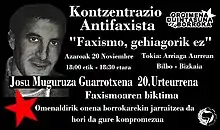Josu Muguruza
Josu Muguruza (1958–1989) was a Basque journalist and politician who was assassinated in Madrid on 20 November 1989. Muguruza was among the leaders of Herri Batasuna, a Basque nationalist political party. He was about to serve at the Spanish Parliament for the party when he was killed.
Josu Muguruza | |
|---|---|
 | |
| Born | Josu Muguruza Guarrotxena 1958 |
| Died | 20 November 1989 (aged 30–31) Madrid |
| Cause of death | Assassination |
| Burial place | Bilbao |
| Occupation | Journalist |
| Political party | Herri Batasuna |
Biography
Muguruza was born in Bilbao in 1958.[1] He received a bachelor's degree in information sciences.[2] He was a journalist by profession[1][3] and worked as an editor-in-chief of Egin newspaper.[2] He was elected as a deputy from the Herri Batasuna in the 1989 general elections.[4]
He had a daughter, Ane Muguruza.[5] She was born two weeks after the murder of his father.[1]
Assassination
Muguruza was assassinated in Madrid on 20 November 1989 before he received his certificate of election.[4] He was dining at a restaurant of Hotel Alcalá.[5] The perpetrators were the members of an anti-ETA group known as GAL.[4] Ricardo Sáenz Ynestrillas, a member of the neo-fascist group, Spanish Social Movement (Movimiento Social Espanol), was arrested and tried for his alleged involvement in the killing of Muguruza, but soon released due to the lack of evidence.[6] Later a former police officer, Ángel Duce Hernández, was arrested on 2 August 1990 and was sentenced to 100 years for the murder of Josu Muguruza.[7] Duce was killed in a traffic accident in Alcorcón in August 1997 while he was using a six-day prison permit.[7]
Funeral and legacy
A funeral ceremony was held for Muguruza in Bilbao on 23 November 1989.[8] A monumental sculpture was erected in his honor in Bilbao.[9]
The day, 20 November, Muguruza was assassinated has been commemorated by the Basque people since on the same day another Herri Batasuna leader Santiago Brouard was assassinated in 1984.[10]
References
- Arantza Alegría (21 November 2019). "Capítulo 14: Los GAL y la extrema derecha contra HB. Los asesinatos de Brouard y Muguruza". Cadena SER (in Spanish). Bilbao. Retrieved 26 March 2022.
- "Josu Muguruza Guarrotxena". Covite. Retrieved 26 March 2022.
- Diego Muro (2009). "The politics of war memory in radical Basque nationalism". Ethnic and Racial Studies. 32 (4): 673. doi:10.1080/01419870801943654. S2CID 145169626.
- José Antonio Pérez (2016). "Democratisation of the Spanish state: Between extreme right-wing violence and police brutality". In Rafael Leonisio; et al. (eds.). ETA's Terrorist Campaign: From Violence to Politics, 1968–2015. Abingdon; New York: Routledge. p. 65. ISBN 978-1-317-32915-2.
- Danilo Albin (20 November 2019). "Familiares de Brouard y Muguruza denuncian el "doble rasero" del Estado en el aniversario de sus asesinatos". Público. p. es. Retrieved 26 March 2022.
- "Spain: Extreme right organise". Statewatch. 1 November 1994. Retrieved 26 March 2022.
- Juan Frances; Jesus Duva (17 August 1997). "Muere en un accidente de tráfico el ex policía que mató a un diputado de HB". El País (in Spanish). Retrieved 26 March 2022.
- "Timeline of terrorism in the Basque country (1968-2011)". Arovite. December 2014. Retrieved 26 March 2022.
- Javier Fernández Vázquez (2018). "After the quarantine: a closer look at monuments to victims of ETA in the Basque country and Navarre". Journal of Spanish Cultural Studies. 19 (2): 224. doi:10.1080/14636204.2018.1456148. S2CID 216092336.
- Jesús Casquete (2013). "Commemorative Calendar and Reproduction of Radical Basque Nationalism". Politics, Religion & Ideology. 14 (1): 29. doi:10.1080/21567689.2012.739968. S2CID 147548419.
External links
 Media related to Josu Muguruza at Wikimedia Commons
Media related to Josu Muguruza at Wikimedia Commons